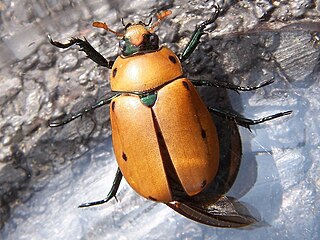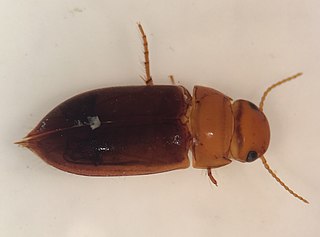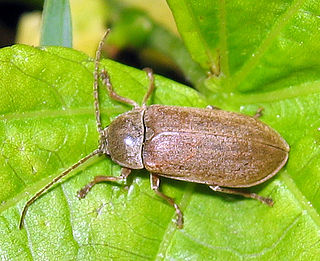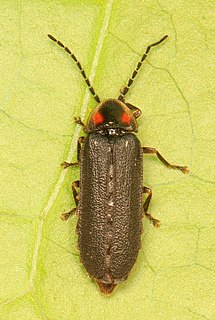
The Tenebrionoidea are a very large and diverse superfamily of beetles. It generally corresponds to the Heteromera of earlier authors.

The Synchroidae are a small family of beetles with no vernacular common name, though recent authors have coined the name synchroa bark beetles. The family consists of three extant genera, Mallodrya, Synchroa, and Synchroina, with a total of nine species.

The grapevine beetle, also known as the spotted June beetle or the spotted pelidnota, is a species of beetle in the family Scarabaeidae, situated in the subfamily Rutelinae. Grapevine beetles are common in the north and central United States and eastern Canada, but do relatively little damage to their host plants. The beetles fly at a fast speed, usually in a curving flight.

The Mycetophagidae or hairy fungus beetles are a family of beetles in the large suborder Polyphaga. The different species are between 1.0 and 6.5 mm in length. The larvae and adults live in decaying leaf litter, fungi, and under bark. Most species feed on fungi. Worldwide, the 18 genera contain around 200 species.

Celina is a genus of predaceous diving beetles in the family Dytiscidae. There are at least 30 described species in Celina.

Elmidae, commonly known as riffle beetles, is a family of beetles in the superfamily Byrrhoidea described by John Curtis in 1830. Both adults and larvae are usually aquatic, living under rocks in fast-flowing shallow areas of streams, such as riffles, feeding on algae and biofilms. There are more than 150 genera and 1,500 described species in Elmidae. The oldest record of the group is Cretohypsilara from the Cenomanian aged Burmese amber.

Phoracantha is a genus of eucalyptus borers in the family Cerambycidae. There are at least two described species in Phoracantha.

Calleida punctata is a species of ground beetle in the family Carabidae. It is found in North America.

Dascillidae is a family of soft-bodied plant beetles in the order Coleoptera. There are at least 15 genera and about 80 described species in Dascillidae.

Throscidae is a family of small false click beetles in the order Coleoptera. In North America, there are 3 genera and 20 described species.

Uloma is a genus of darkling beetles in the family Tenebrionidae. There are at least 50 described species in Uloma.
Cymatodera punctata is a species of checkered beetle in the family Cleridae. It is found in Central America and North America.
Mallodrya is a genus of synchroa bark beetles in the family Synchroidae. There is one described species in Mallodrya, M. subaenea.
Pyrota punctata is a species of blister beetle in the family Meloidae. It is found in Central America and North America.

Lucidota punctata is a species of firefly in the beetle family Lampyridae. It is found in North America.
Graphops is a genus of leaf beetles in the subfamily Eumolpinae. There are 19 described species in Graphops, all from North America. Most species have limited flight capabilities, due to poorly developed wings, and at least one species is known to be flightless.
Hyperaspis punctata is a species of lady beetle in the family Coccinellidae. It is found in North America.
Megetra punctata is a species of blister beetle in the family Meloidae. It is found in Central America and North America.

Synchroa is a genus of synchroa bark beetles in the family Synchroidae. There are about six described species in Synchroa.

Coelocnemis is a genus of darkling beetles in the family Tenebrionidae. There are more than 20 described species in Coelocnemis.















